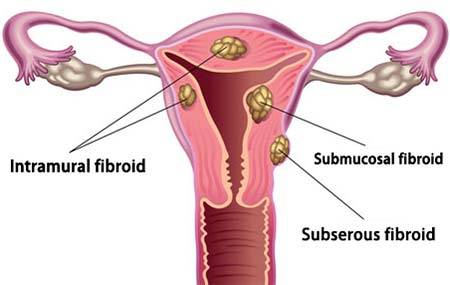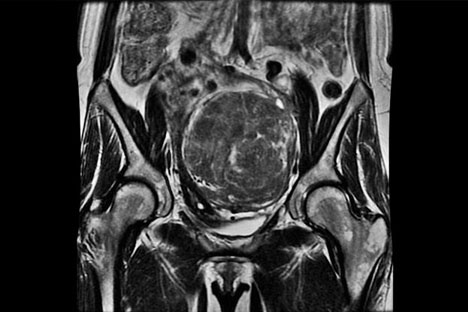Uterine Fibroids
 Chances are that you aren’t aware you have fibroids, which are also referred to as leiomyomas or myomas. Many women don’t experience any symptoms. Fibroids are essentially small balls of muscle that grow in the muscular wall tissue of your uterus. Theye’re almost always non-cancerous, almost never turn into cancer in the future. Women who do experience symptoms may communicate any of the following symptoms:
Chances are that you aren’t aware you have fibroids, which are also referred to as leiomyomas or myomas. Many women don’t experience any symptoms. Fibroids are essentially small balls of muscle that grow in the muscular wall tissue of your uterus. Theye’re almost always non-cancerous, almost never turn into cancer in the future. Women who do experience symptoms may communicate any of the following symptoms:
- Heavy bleeding or painful periods
- Anemia
- Feeling a sense of fullness in your lower stomach
- Noticing your lower abdomen appears to be distended
- Having to frequently urinate
- Pain during sex
- Lower back pains
- Complications during pregnancy and labor
- Rarely, reproductive problems
There is no proof of what causes uterine fibroids; however, a clear link has been established between hormones (in particular, estrogen and progesterone) and their impact on uterine fibroids. Furthermore, the condition is found to run in families, so if you have a close family member who experiences fibroids, you’re at a greater risk. Other risk factors include race, with African American women being more likely to get fibroids, and environmental factors such as birth control use, obesity, and early onset periods. Uterine fibroids should always be evaluated with a thorough consultation and examination by a physician for an accurate diagnosis and treatment plan.
Fibroids affect up to 20-30% of women
NYC Gynecologist of Women’s Health & Wellness offer a comprehensive obstetrics and gyn care in NYC for women of all ages. At our obgyn clinic of we provide a full range of gynecology services, from annual check-ups and routine pap smears to Uterine Fibroids treatment and gyn procedures, surgeries performed in our office or in the hospital. Our state of the art gynecology in Manhattan, NY facility equipped with a latest obgyn equipment.
Diagnosing Uterine Fibroids

There are several different kinds of fibroids, generally described based on where they’re located:
- Submucosal fibroids grow in the uterine cavity.
- Intramural fibroids are located in the wall of the uterus.
- Subserosal fibroids are found growing on the outside of the uterus.
Fibroids lead to a larger than normal uterus. They impact the size of your uterus just as pregnancy does. Because of this, your NYC OBGYN refers to your uterus size (normal size of uterus vs not) in comparison to a specific number of weeks pregnant. For example, your obgyn doctor may tell you that fibroids have put your uterus into the 10-week of pregnancy range, which of course is larger than usual. Your gynecologist may also describe your fibroids by comparing them to any of several round objects, from seeds to nuts, a golf ball to a fruit. Your Midtown Manhattan gynecologist might order some imaging tests to describe a fibroid in greater detail, including:
- Ultrasounds which are painless, noninvasive and can show your obgyn doctor or internal pelvic organs.
- Magnetic resonance imaging, or MRI, uses a magnetic field to produce a detailed picture.
- X-rays are well known and use tiny amounts of radiation to create a picture of solid elements of your body, such as bones.
- Computerized tomography, or CT scan, creates a more three-dimensional image by taking many X-rays and piecing them together.
- Hysterosalpingogram uses injected dye and X-rays to create a picture.
- Sonohysterogram uses injected water and ultrasound to create an image.
- Laparoscopy allows your obgyn doctor to see inside your uterus via a small incision in your abdomen. After inserting a thin tube with a light and a camera on the end of it, your OBGYN can take pictures during this procedure.
- Hysteroscopy also involves a scope on a thin tube with a light. In this procedure, the scope is inserted through your vagina, past your cervix and further into your uterus. Polyps can also be detected using this procedure.
Treatment Without Symptoms?
Most women don’t know they have fibroids
Most of the time, uterine fibroids are only treated if the symptoms are annoying or painful for you depending on your gynecologist’s recommendation after careful examination. So normally your gynecologist either treats your symptoms or removes the fibroids via medications or surgical procedures.
For example, your gynecologist may prescribe medications for fibroids, including:
- Over-the-counter pain medications of your choice, usually nonsteroidal anti-inflammatory drugs (NSAIDs)
- Iron supplements, as the potential for anemia due to heavy bleeding is a potential hazard with fibroids
- Low-dose birth control pills containing a combination of hormones that will not stimulate fibroid growth, but can slow or stop bleeding
- Birth control injections that are heavy on progesterone, which can provide relief of symptoms
- Hormonal IUDs, which contain small doses of medicine that’s progesterone-like and can also perform double duty as both a birth control and a control of symptoms like heavy bleeding
Surgical solutions for uterine fibroid cysts are rare, but include:
- Myomectomy is performed to remove fibroids with minimal damage to the healthy uterine tissue surrounding the fibroids. Women who would like to get pregnant often opt for this procedure. This procedure can be minimal or it can be a major surgery, depending on the location and size of your fibroids.
- Hysterectomy is the removal of your entire uterus. It’s usually only performed when it’s the last solution available to remove fibroids from your reproductive system. It’s a complete and total cure for fibroids, but it means pregnancy is impossible after this surgery. Typically, your ovaries are retained, especially if you’re a younger woman, to keep you from starting menopause too early.
- Endometrial Ablation involves removing or burning out the lining of the uterus, usually with radiofrequency waves that can reduce how much you bleed and sometimes reduce the amount of pain you have due to problems with the uterus such as fibroids. This is a procedure reserved for women who have completed child bearing.
- Uterine Fibroid Embolization (UFE) or Uterine Artery Embolization (UAE) cuts off the blood supply to the fibroids using tiny gel particles that are placed in the fibroids via a tiny tube threaded through the blood vessels. Again, this procedure will not allow you to become pregnant later.
Fibroids and Pregnancy
Fibroids are usually considered a complication of pregnancy, because while they don’t typically interfere with the getting pregnant part, it’s possible for fibroids to cause miscarriage or infertility. There are also concerns that fibroids could raise the risk of certain pregnancy complications.
If you’re trying to get pregnant and you’re aware you have fibroids or have had them in the past, alert your NYC gynecologist to this immediately.
Important Reminder: This information is only intended to provide gynecology guidance, not definitive medical advice. Please consult obgyn doctor about your specific condition. Only a trained, experienced gynecologist or certified gynecology NYC specialist can determine an accurate diagnosis and proper treatment.
Have questions? Schedule an appointment with the leading OB Gynecologist in Midtown NYC, Dr Fernando Mariz, today.
Updated on Jun 26, 2020 by Dr. Fernando Mariz (Gynecologist), Manhattan Women’s Health and Wellness
Best-in-class
New York Gynecology Clinic
Manhattan Specialty Care in the Press

Call now to make an appointment with our highly rated Manhattan Gynecology doctors regarding your health. We look forward to seeing you!
book online now
(212) 378-9987
New York City Locations:
Manhattan Women's Health & Wellness (Upper East Side)
983 Park Ave, Ste 1D17
New York, NY 10028
(212) 389-1904
Manhattan Women's Health & Wellness (Midtown)
51 East 25th St, Ste 451
New York, NY 10010
(212) 677-7654
Manhattan Women's Health & Wellness (Union Square)
55 W 17th St, Ste 104
New York, NY 10011
(212) 378-9985